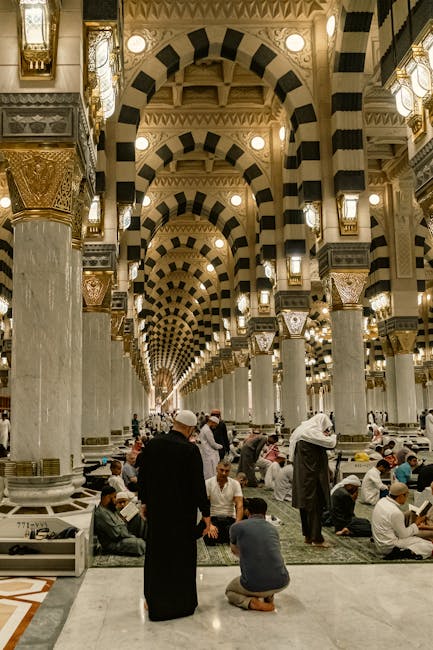PARA HABIB ADALAH PENYEBAB KERUSAKAN AGAMA ISLAM???!!! MURTAD BERJAMAAH KALAU SEPERTI INI?! – Rethinking Religious Discourse

PARA HABIB ADALAH PENYEBAB KERUSAKAN AGAMA ISLAM???!!! MURTAD BERJAMAAH KALAU SEPERTI INI?! – Rethinking Religious Discourse
The internet is a wild place. A headline like "PARA HABIB ADALAH PENYEBAB KERUSAKAN AGAMA ISLAM???!!! MURTAD BERJAMAAH KALAU SEPERTI INI?!" is designed to grab attention, provoke strong reactions, and, frankly, spread potentially harmful rhetoric. But rather than simply dismissing such a statement as inflammatory, let's use it as a jumping-off point for a more nuanced discussion about religious leadership, interpretation, and the dangers of generalization and extremism.
It's crucial to state upfront that the idea that all habibs are causing the destruction of Islam, leading to mass apostasy, is an extreme and unsubstantiated claim. Such generalizations are dangerous and harmful because they stereotype a diverse group of individuals and incite division. Think of it like saying all doctors are causing a health crisis, or all politicians are corrupt. It's simply not true and unfairly paints an entire profession (or in this case, a group of religious leaders) with the same negative brush.
Understanding the Role of Habib in Islamic Tradition

Before diving deeper into the controversy, it's important to understand what a "habib" represents in Islamic tradition. The term "habib" (حبيب) literally means "beloved" in Arabic. It's a title of respect often used for descendants of the Prophet Muhammad (peace be upon him) and individuals known for their piety, knowledge, and dedication to serving the Muslim community. Historically, habibs have played a vital role in disseminating Islamic teachings, promoting spiritual guidance, and mediating disputes. They are often seen as figures of authority and inspiration.
However, like any group of people, habibs are not monolithic. They hold diverse opinions, come from various backgrounds, and practice Islam in different ways. Attributing the actions of a few individuals to the entire group is a logical fallacy that can lead to prejudice and discrimination. Imagine labeling all scientists as unethical because of a few high-profile cases of fraudulent research. It's simply unfair and inaccurate.
Why the Controversy? Examining Potential Sources of Discontent

So, why would someone make such a strong and accusatory statement about habibs? There could be several underlying factors contributing to such sentiments:
- Differences in Religious Interpretation: Just as with any religious text, the Quran and Hadith (sayings and actions of the Prophet Muhammad) are subject to different interpretations. Some habibs might promote interpretations that are considered unorthodox or controversial by certain segments of the Muslim community. This can lead to accusations of deviating from the "true" path of Islam.
- Political Involvement: In some regions, habibs have become politically active, aligning themselves with specific parties or movements. This can create divisions and lead to accusations of using religion for political gain or supporting policies that are considered unjust.
- Financial Misconduct: Sadly, there have been instances of habibs being accused of financial impropriety or misusing their positions of authority for personal enrichment. Such incidents can erode public trust and fuel resentment.
- Cultural Differences and Practices: Islamic practices can vary across different cultures and regions. Some practices associated with certain habibs might be perceived as superstitious or contrary to the core teachings of Islam by others.
- The Spread of Misinformation: In today's digital age, misinformation can spread rapidly. False accusations or distorted information about habibs can easily circulate online, influencing public opinion and contributing to negative perceptions.
It's crucial to investigate specific claims of wrongdoing rather than resorting to blanket condemnations. Critical thinking and fact-checking are essential tools in navigating complex religious and social issues.
The Dangers of Generalization and Extremism in Religious Discourse

The statement "PARA HABIB ADALAH PENYEBAB KERUSAKAN AGAMA ISLAM???!!! MURTAD BERJAMAAH KALAU SEPERTI INI?!" exemplifies the dangers of generalization and extremism in religious discourse. Here's why:
- It Fuels Division: By painting an entire group as inherently corrupt and destructive, it creates animosity and mistrust between different segments of the Muslim community. This can lead to social fragmentation and conflict.
- It Silences Diverse Voices: It discourages open dialogue and critical thinking by creating a climate of fear and intimidation. Individuals who might have valid concerns about specific issues may be hesitant to speak out for fear of being labeled as enemies of Islam.
- It Creates a Breeding Ground for Extremism: Extreme generalizations can be easily manipulated by extremist groups to justify violence and hatred against specific communities or individuals.
- It Distorts the Image of Islam: Such statements contribute to negative stereotypes about Islam and Muslims, reinforcing prejudices and misconceptions in the wider world.
Instead of engaging in sweeping condemnations, we need to foster a culture of respectful dialogue, critical thinking, and evidence-based analysis. This means challenging generalizations, seeking out diverse perspectives, and focusing on specific issues rather than resorting to broad accusations.
Murtad Berjamaah: The Gravity of Apostasy in Islam

The phrase "Murtad Berjamaah," which translates to "mass apostasy," is a particularly loaded term. Apostasy, the renunciation of Islam, is considered a grave sin in many interpretations of Islamic law. Accusing individuals of leading others into apostasy is a serious charge that can have severe consequences.
However, it's important to remember that interpretations of Islamic law regarding apostasy vary widely. Some scholars argue that apostasy should not be punishable by death, while others maintain that it should be. Furthermore, there's often disagreement on what constitutes apostasy in the first place. Does simply questioning certain religious beliefs automatically make someone an apostate? Or does it require a formal and public renunciation of Islam?
Using the term "Murtad Berjamaah" casually can be incredibly damaging. It can incite hatred, violence, and even calls for the persecution of those accused of leading others astray. It's crucial to exercise caution and avoid using such language unless there is clear and irrefutable evidence of apostasy, and even then, to advocate for justice and due process rather than violence and hatred.
Moving Forward: Fostering Constructive Dialogue and Critical Thinking

So, how can we move forward in a way that promotes understanding, respect, and critical thinking within the Muslim community and beyond? Here are a few suggestions:
- Promote Religious Literacy: Educate yourself about the diversity of Islamic thought and practice. Read widely, engage with different perspectives, and challenge your own assumptions. Don't rely solely on one source of information.
- Engage in Respectful Dialogue: Create spaces for open and honest conversations about sensitive religious issues. Listen to others with empathy and respect, even when you disagree with their views. Avoid personal attacks and focus on the issues at hand.
- Challenge Misinformation: Be vigilant about identifying and debunking false or misleading information about Islam and Muslims. Share accurate information and counter negative stereotypes.
- Support Responsible Religious Leadership: Encourage religious leaders who promote peace, tolerance, and critical thinking. Hold them accountable for their words and actions, and challenge them when they promote hatred or division.
- Focus on Common Ground: Emphasize the shared values and principles that unite Muslims across different backgrounds and perspectives. Focus on building bridges rather than walls.
- Embrace Critical Thinking: Question everything. Don't accept information at face value. Seek out multiple sources, analyze the evidence, and draw your own conclusions.
Innovation in Islamic Discourse: Embracing Modern Tools

Furthermore, we need to embrace innovation in how we approach Islamic discourse. The digital age presents both challenges and opportunities. We can leverage technology to:
- Create Online Platforms for Dialogue: Develop online forums and social media groups where Muslims from diverse backgrounds can engage in respectful and constructive conversations about religious issues.
- Disseminate Accurate Information: Use social media and other online platforms to share accurate information about Islam and counter negative stereotypes.
- Promote Islamic Education: Create online courses and educational resources that make Islamic knowledge accessible to a wider audience.
- Develop Apps for Islamic Practice: Create apps that help Muslims connect with their faith in meaningful ways, such as prayer time reminders, Quran recitation tools, and online communities for support and encouragement.
- Utilize AI for Translation and Interpretation: Explore the potential of artificial intelligence to translate religious texts and provide different perspectives on Islamic teachings.
By embracing innovation and fostering a culture of critical thinking and respectful dialogue, we can move beyond inflammatory headlines and create a more informed, tolerant, and just world for all.
Ultimately, the statement "PARA HABIB ADALAH PENYEBAB KERUSAKAN AGAMA ISLAM???!!! MURTAD BERJAMAAH KALAU SEPERTI INI?!" is a reflection of a deeper set of anxieties and tensions within the Muslim community. Rather than simply dismissing it as hate speech, we should use it as an opportunity to examine the underlying issues, promote understanding, and build a more inclusive and compassionate future for all.